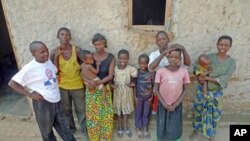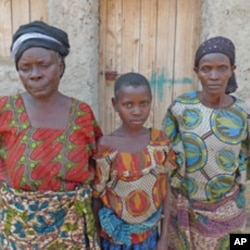It has been five years since Burundi's civil war ended. Tutsis and Hutus clashed in a conflict that lasted 13 years, leaving an estimated 300,000 dead. But there is a longer history of ethnic violence in Burundi and a unique effort is under way to reconcile the two ethnic groups.
A baby goat cries for its mother inside a small wooden shed in Mutambara Peace Village.
About 1,600 Burundians live in this village, with its 300 identical two-room homes constructed of concrete with tin roofs. It was set up by the United Nations and Burundi's government as an experiment in reconciliation to see if Hutus and Tutsis could better understand each other by living side by side.
Burundi's ethnic clashes have been a problem for generations. In 1972, the Tutsi-dominated government launched a campaign of violence against the Hutu majority. In what an international commission dubbed genocide, up to 200,000 people were killed and hundreds of thousands more fled the country.
Nyandwi Philemon was one of them, ending up in Tanzania with his parents in 1972, when he was just three years old. He returned to his homeland five years ago and was given a home in the Peace Village.
He says when his family was in the refugee camps, people used to say, "We cannot live with people from other ethnic groups." But, he says, when we are here, we see that we can live with them without any problems.
Philemon is a Hutu married to a Tutsi. He said he does not care about ethnicity, saying it is used by politicians "to get power." As the camp's government representative, he says he has never received any complaints related to ethnicity.
According to Peace Village resident Denise Ndabige, it is not the problem anymore. The biggest challenge is a lack of food.
She says she has not eaten this morning, and neither have her children. She says the problem is finding food because the residents do not have a way to cultivate crops, and without land they can not even grow small things like vegetables. She says they just stay there, just perhaps waiting for death.
Each family is given a plot of land, but it is not big enough to cultivate crops. Charities are helping, but the Peace Village project was not designed to support the residents, just give them a place to live.
While there is a nearby medical clinic, getting medical care is also a problem for Ndabige and other residents.
He says the residents have no money to go to hospitals. He says he has an eye problem, but the hospital charged so much he decided to stay at home without taking medicine.
Ndabige says the solution is more support from the government.
The Hutus and Tutsis living together as neighbors say they have come to realize they are not so different and that they are facing similar problems each day in Burundi, be it paying for medical care or figuring out where the next meal will come from.
Despite the challenges of life in the Peace Village, resident David Thomas Ciza said he is thankful to have a home.
He says when the refugees were in Tanzania, they were facing a terrible situation. They were threatened by different security services, like the army and police, but in Burundi, it is safe now and no one comes to ask for your identity card. He says, "We are free," and he is happy to have his feet on Burundi soil because it is his country.
While there is peace, the Hutus and Tutsis who live in the Mutambara Peace Village say they still need food and other resources to lead a meaningful life. This is a problem also faced by millions in Burundi, one of the world's poorest countries. But the government has provided little help, regardless of ethnicity.






